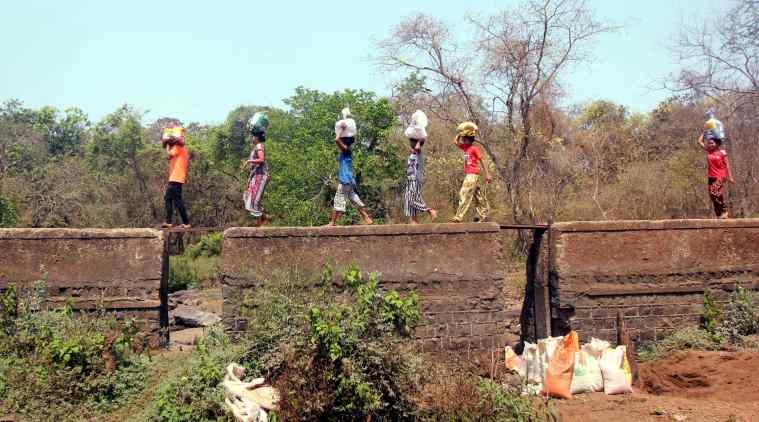 To ensure food security, the report recommends free groceries, including nutritious food such as millets, wheat, dal and vegetables, to be supplied through the Public Distribution System (PDS) for the next six months. (File)
To ensure food security, the report recommends free groceries, including nutritious food such as millets, wheat, dal and vegetables, to be supplied through the Public Distribution System (PDS) for the next six months. (File)
POINTING to the widespread loss of livelihood and deepening economic distress among tribal communities across the country on account of the lockdown since March 22, civil society organisations have called for a COVID-19 response cell to be set up in the Union Ministry of Tribal Affairs that can coordinate with the state governments and activists to provide relief to indigenous communities through the remainder of the lockdown and after.
In a preliminary assessment report on the impact of the pandemic and the lockdown on tribal communities, organisations including Community Forest Rights – Learning and Advocacy (CFR-LA), All India Forum of Forest Movements as well as independent researchers and experts have said a concerted response from the MoTA is necessary to curtail the numbers of COVID-19 cases among tribals. The Union government’s identified COVID-19 hotspots include 19 scheduled districts. Other tribal pockets have reported positive cases too.
COVID-19 response schemes specifically for tribal people must focus on raising awareness, ramping up testing in tribal areas, providing food security and livelihood support, and these may be supported through funds available under Article 275 as well as funds available in the District Mineral Funds, Special Purpose Vehicles for various projects, etc, the report said.
To ensure food security, the report recommends free groceries, including nutritious food such as millets, wheat, dal and vegetables, to be supplied through the Public Distribution System (PDS) for the next six months. It has also recommended plans to ensure wage employment for all tribals and Other Traditional Forest Dwellers (OTFD) under MGNREGA as well as the additional 50 days of work that land title holders under the Forest Rights Act are entitled to; effective mechanisms for collection, storage, procurement and sale of non-timber forest produce (NTFP) during the ongoing collection season; waiver of GST on tendu leaves; and modification of the Union government’s April 6 order restricting movement of people in national parks, tiger reserves and other protected areas, a move that adversely impacts an estimated 3 million people living in and around these protected areas.
“High level of social deprivation and exclusion has led to the prevalence of diseases and health concerns such as malnutrition, malaria, leprosy, tuberculosis (TB) and other diseases. Absence of healthcare facilities can severely limit the capacities to deal with any major COVID-19 outbreak in tribal areas posing a serious threat to the tribal population,” the report says.
Tushar Dash of CFR-LA said the report presses for a mechanism to specifically address issues faced by tribals due to the lockdown and the pandemic. “We have submitted the report to various state and central agencies, but there has been no response except regarding the guidelines for NTFP and minimum support price for forest produce. And those do not actually address the issue comprehensively,” he said.
Dash said Kerala and Chhattisgarh have shown some proactive measures for tribals and Particularly Vulnerable Tribal Groups (PVTGs) through PDS, health facilities and MSP for forest produce.
Odisha and Maharashtra have similarly released guidelines for support price.
The report also cites instances of tribal migrant workers being stuck in cities with no access to food or work or means to return home, and their livelihood affected due to difficulties in accessing NTFP or MFP. “Those who are stuck in the cities are without any support system, shelter, food, or water and facing acute hunger and almost a famine like situation. In addition, they have to often face police atrocities and criminalization, causing mental and psychological distress,” the report says.
On collecting forest produce, a Kolam tribal at Kinwat taluka of Nanded district was reported beaten by local officials for going into the forest to collect bamboo, it says.
“An estimated 100 million forest dwellers depend on MFP for food, shelter, medicines and cash income. The NTFP collection season from April to June provides major income support to tribals (almost 60 per cent of annual collection takes place during this period) and, most unfortunately, it coincides exactly with the lockdown,” the report says, adding that as women are actively engaged in this work, the ripple effects on the general health of families will also be affected.